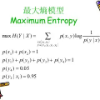Bounded rationality is an important consideration stemming from the fact that agents often have limits on their processing abilities, making the assumption of perfect rationality inapplicable to many real tasks. We propose an information-theoretic approach to the inference of agent decisions under Smithian competition. The model explicitly captures the boundedness of agents (limited in their information-processing capacity) as the cost of information acquisition for expanding their prior beliefs. The expansion is measured as the Kullblack-Leibler divergence between posterior decisions and prior beliefs. When information acquisition is free, the \textit{homo economicus} agent is recovered, while in cases when information acquisition becomes costly, agents instead revert to their prior beliefs. The maximum entropy principle is used to infer least-biased decisions, based upon the notion of Smithian competition formalised within the Quantal Response Statistical Equilibrium framework. The incorporation of prior beliefs into such a framework allowed us to systematically explore the effects of prior beliefs on decision-making, in the presence of market feedback. We verified the proposed model using Australian housing market data, showing how the incorporation of prior knowledge alters the resulting agent decisions. Specifically, it allowed for the separation (and analysis) of past beliefs and utility maximisation behaviour of the agent.
翻译:由于代理商的加工能力往往受到限制,使得完全合理性假设无法适用于许多实际任务,因此,合理性是一个重要的考虑因素。我们建议对史密斯竞争下的代理商决定的推论采取一种信息理论方法。模型明确反映了代理商(其信息处理能力有限)的界限,作为扩大其先前信仰的信息获取成本。扩展的衡量标准是事后决定与先前信仰之间的Kullblack-Leeber差异。当信息获取自由时,则恢复了完全合理性代理商,而在信息获取费用昂贵的情况下,代理商则恢复了原先的信念。最大通缩原则用于根据Smitrian竞争概念(其信息处理能力有限)的界限,以扩大其先前的信念为扩大其先前信仰;将先前的信念纳入这样一个框架,使我们能够在市场反馈中系统探讨先前的信念对决策的影响。我们用澳大利亚住房市场数据核实了拟议的模型,并用澳大利亚住房市场数据来证实先前的信念恢复了原先的信念。最大通俗原则用来推断Smitrial 并允许将先前的信念纳入过去的理论分析。





